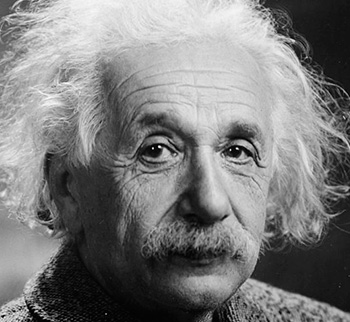Albert Einstein’s parents were assimilated German Jews who considered themselves “Israelites,” which was typical of westernized Jews in Germany in the late 19th and early 20th centuries. Einstein, who was born in 1879, did not have a bar mitzvah, though as a young man he did show a keen interest in religion and for a time adhered to Jewish dietary rules.
After spending more than two decades studying and working in Switzerland, where he developed his theory of general relativity, he returned to Berlin in 1914. He accepted a position as the director of the Kaiser Wilhelm Institute for Physics, where he would remain until he was forced to flee to the United States in 1933 following the Nazi’s rise to power.
In Switzerland, as he later admitted in a 1921 interview, he was ambivalent about his Jewish heritage. “There was nothing in my life that would have stirred my Jewish feeling or stimulated it,” he said. Yet in Berlin during and after World War I , he was confronted with anti-Semitism. It was then that Einstein began to reflect more seriously on his Jewish identity and write about it.
Tracking his Jewish and Zionist awakening online is now possible, owing to the recent digitization (and translation from German to English) of thousands of his letters and papers – a joint effort between the Hebrew University, which Einstein helped found in 1918 and where the Albert Einstein Archives are located; Princeton University, where he taught after he came to the United States; and the California Institute of Technology.
In a newspaper article published at the end of 1919, Einstein denounced the widely held right-wing propaganda that Germany’s approximately 30,000 east European Jews were “black marketers, Bolsheviks [and] elements that are averse to work.” The agitation against these Jews that called for their expulsion, he asserted, “raises the suspicion that calm judgment is being dimmed by strong anti-Semitic instincts.”
In another unpublished article he penned in the spring of 1920, he was more critical of German Jews like his parents, those who perceived themselves to be “German citizens” of the “Mosaic faith.” To Einstein there was “something comical, even tragicomical in this designation.” In a world in which “race” and nationalism were powerful concepts, he believed strongly that there was a “Jewish nationality” that defined Jews, no matter what their socio-economic status. And pretending otherwise was “useless and morally questionable,” in his view. Moreover, at the time it was a no-win situation since, as he put it, “anti-Semites have no intention of clearly distinguishing between eastern European and western European Jews as some western European Jews might wish.”
Einstein was initially indifferent to Zionism and at one point scorned Zionists as a “small band of impractical people that strike one as medieval.” Yet like Theodor Herzl, who wrote in 1895 that “only anti-Semitism” had made him a Jew, Einstein, too, was drawn to the movement as a backlash against anti-Semitism and as a necessity for Jewish survival.
“I am not a Jew in the sense that I would demand the preservation of the Jewish or any other nationality as an end in itself,” he explained in 1921. “I rather see Jewish nationality as a fact, and I believe every Jew must draw the consequences from this fact. I consider raising Jewish self-confidence necessary, also in the interest of a normal living together with non-Jews. This is the major motive of my joining the Zionist movement…The founding of a free Jewish community structure in Palestine will again put Jewish people in a position where they can unencumbered fully uphold their creative capabilities.”
By then, he had concluded that European Jews needed access to higher education, and if that was not possible in Europe, then a university in Jerusalem was a necessity. And more significantly, that fostering Jewish pride was essential. “We Jews need a revival of the feeling of community in order to preserve or rather regain a dignified existence,” he wrote to a friend in November 1929. “I see in Zionism the only effort which leads us closer to this goal.”
Historian Allan Levine’s most recent book is Toronto: Biography of a City.
